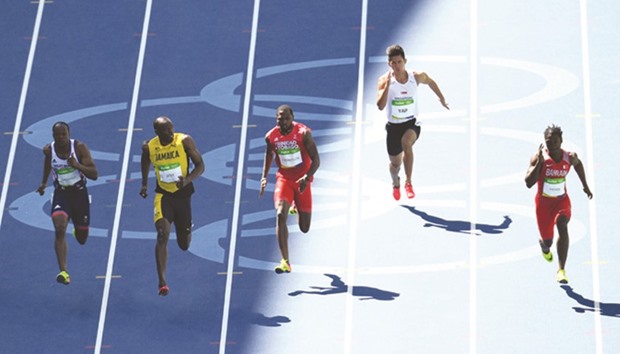Jamaican Usain Bolt won his 100 metres heat after what he called a ‘sluggish’ start yesterday, but looked pained after the race as he prepared to fend off the challenge of American Jason Gatlin for the Olympic crown. Bolt, who turns 30 on the final day of the Games, is aiming high in what he has said will be his final Olympics, bidding to continue his streak of gold in the men’s 100m, 200m and 4x100m relay, the unprecedented “triple-triple”.
He qualified in a leisurely 10.07 seconds, picking up the pace after lumbering from the blocks and looking stiff in his warm-up. “It wasn’t the best start, I feel kind of sluggish. I think it’s the fact that it’s the morning. I’m not usually running this early in the morning,” Bolt told reporters after the race which began at 12:42 pm local time in warm sunshine.
“Hopefully, tomorrow I’ll feel much better,” he added of today’s action when the semis and final take place late in the evening. He batted back questions about his leg, saying he was “good”.
Gatlin, 34, produced the fastest time of the morning, 10.01 as the 2004 champion seeks to become the oldest man to win a medal in the 100m and the first to do so after serving two doping bans. “I am just staying focused, I went out there and executed my race in the first round and cruised to finish line,” Gatlin said.
Asked if the race felt more special, given that it is likely to be his last Olympics, Gatlin replied: “Every Olympics is special but as you get older you understand the importance of running at Olympics.”
Ben Youssef Metie, 29, of the Ivory Coast, notched the morning’s second-fastest time of 10.03, edging US
hopeful Trayvon Bromell’s 10.13, which was still fast enough to qualify.
Canada’s Andre de Grasse, a 21-year-old who only took up running seriously three years ago after an early focus on basketball, ran 10.04.
Twelve months ago, when Bolt vanquished Gatlin in the World Championship 100m final, many suggested the Jamaican sprint king had “saved” his sport from a bruising reputational body blow. The prospect of 2004 Olympic champion Gatlin — twice found guilty of doping during his career — was too much to stomach for many in athletics.
Yet the notion that Bolt’s victory in Beijing had set track and field on a road to redemption turned out to be woefully premature. In the 12 months since, athletics has been left reeling by a corruption scandal involving top-level administrators and revelations over Russian doping that plunged the sport into the worst crisis in its history.
It means that today’s 100m final at Rio de Janeiro’s Olympic Stadium, set for 10.25pm local time (4:25am Monday Qatar time) will inevitably once more be framed as a battle of ‘good versus evil’ — Bolt vs Gatlin.
In a global audience of hundreds of millions, many fans, including International Association of Athletics Federations chief Sebastian Coe, may be tempted to watch through their fingers. Gatlin, 34, wearily rejects a narrative he sees as unfair, adamant that his story is far more nuanced than the bald, oft-applied label — ‘two-time dope cheat’ — implies.
His first doping suspension in 2001 arose from the use of a drug to treat attention deficit disorder that he had been prescribed since childhood. The US panel hearing that case found he ‘was certainly not a doper.’
A second positive in 2006 — for excessive levels of testosterone — was more problematic. Gatlin blamed the results on sabotage by a therapist but was banned for eight years, later reduced to four on appeal.
Gatlin may find it hard to escape the opprobrium, however, if he defeats Bolt today to deny a fairytale swansong for the sport’s greatest showman.
Bolt has endured a frustrating season, repeatedly bothered by a hamstring problem that has required extensive treatment and forced him to cut short his appearance at Jamaica’s trials in Kingston in July.
The likeliest challenge to Bolt and Gatlin could come from the next generation of sprinters led by Trayvon Bromell of the United States and France’s Jimmy Vicaut.

Jamaica’s Usain Bolt (second left) sprints to victory in the 100m heats at the Olympic Stadium in Rio de Janeiro. (AFP)
